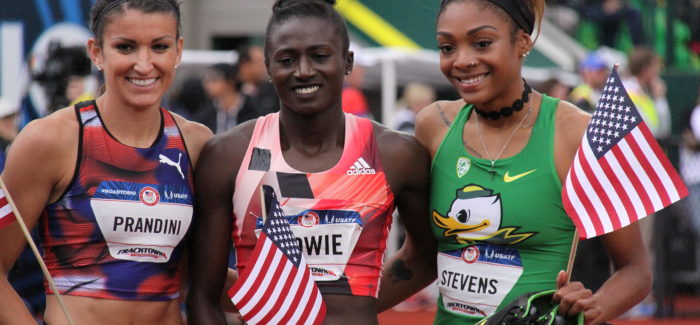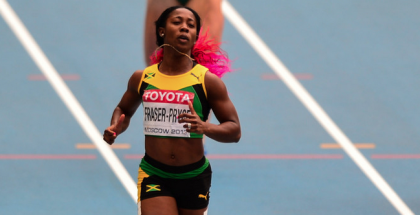The end of the Felix double, Conley/Martinez rebound, McLaughlin makes history
Kevin Sully | On 11, Jul 2016
The final day of the Olympic Trials might have been the most eventful. Allyson Felix didn’t qualify, an Oregon sophomore made the 200m team and there were three races where the team was decided by less than a tenth of a second.
Here’s a few things I didn’t expect at the beginning of the season that came to fruition on Sunday.
Kim Conley and Brenda Martinez would qualify on their second chance
Both women had had their chances in their preferred event scuttled by unfortunate circumstances.
Martinez had a starring role in the Shakespearean women’s 800m. A still unclear collision and a stumble put her out of contention on the final curve. ”I kind of just shut my eyes, like this is not happening,” Martinez said after the race.
But it was happening, and Martinez then had one remaining chance to get on the Olympic team. She still had a good shot in the 1500m, a race she’s had success in, but the most likely scenario put her behind favorites Jenny Simpson and Shannon Rowbury. In the Trials, though, even karma doesn’t follow a easy path. In the final meters she had to hold off Amanda Eccleston. “I felt myself falling,” Martinez said of the last five meters. I think my legs just buckled under me and that’s just all I had.”
Martinez fell at the line to finish .03 ahead of Eccleston. Though it happened in the most roundabout way, the 1500m might end up being a better path to a medal for Martinez at the Olympics. With Caster Semenya and Francine Niyonsaba in the 800m, two medals are probably spoken for. If Genzebe Dibaba isn’t in the 1500, then that event is wide open.
After Kim Conley’s shoe came off and ruined her chances early in the 10,000m last Saturday, she was all silver linings. ”I guess I’m just a happy person,” Conley said after the first round of the 5000m on Thursday. “My plan had been to leave after the break, after Kate’s [Grace] race. So I was really happy that I got to stay for the rest of the Trials.” Her prolonged visit to Eugene culminated with an Olympic berth. In the 5000m, she stuck in the pack as the field was subjected to another Molly Huddle-induced death march.
There were still six women in contention at the bell, when Huddle separated. Shelby Houlihan stayed the closest and finished second. Conley emerged from the group of Emily Infeld, Katie Mackey and Abbey D’Agostino to take third. As of now, the 10,000m team is Huddle-Houlihan-Conley.
If Huddle decides to only run the 10,000 in Rio, then Infeld would move up to the third spot. Infeld also qualified in the 10,000 so there is a chance that she passes on the spot as well. Then it’s….come on down Abbey D’Agostino….your fifth is as good as third.
Lashawn Merritt, and not Allyson Felix, is going for the 200/400 double in Rio
Two women with Oregon jerseys in the final, Allyson Felix off the team, Jenna Prandini needing a desperate lunge to get to the Olympics — the 200m took a turn toward the bizarre. Let’s start with Felix. She looked flat and came off the curve well behind Tori Bowie. She was in the top four coming down the homestretch, but didn’t have the typical Felix close over the last 50 meters. Maybe that was a result of the injury which shortened her preparations. Or perhaps her strength has shifted toward the 400m. In front of her, Bowie ran 22.25 into a slight headwind. Oregon sophomore Deajah Stevens took second in 22.30 and Prandini tumbled across the line to beat Felix by .01 — 22.53 to 22.54.
Felix appeared to be in a state of disbelief when the times posted on the scoreboard. Stevens was also in shock, “I was 13 when I started track and Allyson Felix was huge, you know. Allyson Felix this, Allyson Felix that,” Stevens said. “That was my idol. She still is.”
There would be a concerted effort to push the pace in the men’s 1500m final
Before the race, this was the smart play considering only five of the 13 men had the standard. But I had two assumptions at the beginning of the year:
1) More than five men would have the Olympic standard entering
2)The race would become tactical regardless, because that is how championship 1500m races fall, even when logic dictates others.
Credit to Jordan McNamara, Eric Avila and Izaic Yorks on Sunday for each taking a turn at the lead — even to the detriment of their final finishing place. With a 58-second first lap, the race for the three spots turned into a Diamond League race.
The top three seemed certain to run under the Olympic standard. That’s the way it developed, but the three who crossed the line first already had the standard anyway. Matt Centrowitz ran a smart and efficient race to win in 3:34.09. Robby Andrews, the kicker (who will soon be known simply as Robby Andrews, the really good 1500m runner), took second in 3:34.88. Ben Blankenship kept Leo Manzano at bay to get the final spot. Manzano protested the outcome, but the result held. Yorks, Avila and McNamara finished 10th, 11th and 13th, respectively. There’s a reason why this strategy isn’t used more often.
Vashti Cunningham won’t be the youngest American in Rio
The oft-overlooked 400m hurdles have a story now. Just 16, Sydney McLaughlin set a world junior record to finish third behind Dalilah Muhammad and Ashley Spencer. McLaughlin said before the race she just wanted to PR and wasn’t concerned with making the Olympic team. Well, she PR’d and qualified, running 54.15. Excellent planning for a teenager.
Cunningham’s chances at a medal are still higher (and her father is still Randall Cunningham), but McLaughlin is a capable of making a final. The top three on Sunday put up the first, fourth and seventh best times of the year. Also, two of the top three are Americans won’t be in Rio (Shamier Little and Georganne Moline).



















Submit a Comment